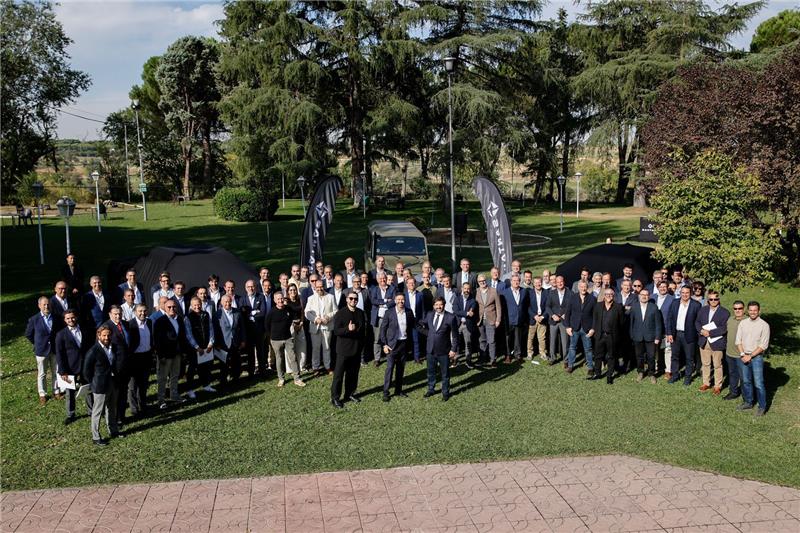
EVERYTHING YOU NEED TO KNOW ABOUT WHAT A SALES PROMOTER IS

In a retail environment where purchasing decisions are increasingly faster, more informed, and more emotional, the sales representative becomes a key link between the brand and the end consumer. Their work represents the essence of the brand, builds relationships with customers in real time, and boosts conversions directly at the point of contact.
At Staff Global, with years of experience managing sales teams in dynamic, multi-channel environments, we know that understanding what a sales promoter is goes far beyond its traditional definition. It involves understanding their strategic role within the sales ecosystem, their ability to influence the customer experience, and their direct impact on brand perception and positioning.
Whether you’re considering adding sales promoters to your sales force or considering this career as a development opportunity, this guide will provide a comprehensive, up-to-date, and results-oriented overview of the current role of a sales promoter.
SALES PROMOTER WHAT IS IT?
A sales promoter is a professional trained to act as a brand ambassador to the end consumer. Their primary role is to generate interest, inform, and persuade in an active and empathetic manner , transforming traditional retail spaces into experiential environments that awaken the desire to purchase.
This role is often deployed in in-person settings: supermarkets, specialty stores, shopping centers, events, trade shows, or promotional activities. In these spaces, the promoter not only visually represents the brand but also facilitates the tangible experience with the product , resolving questions, removing barriers, and creating memorable moments that reinforce positive customer perceptions.
Sales Promoter: Main Responsibilities
The work of sales promoters directly impacts conversion metrics, consumer perception, and product positioning. At Staff Global, where we manage promotion teams for major brands, we’ve identified five key areas that define their responsibilities:
- Product activation : Dynamically present the product’s features, benefits, and differentials, using clear, customer-tailored language.
- Personalized interaction : Generate a real human connection with the consumer through dialogue, active listening, and empathy.
- Resolving doubts : Act as a reliable source of information, providing technical or comparative details that support the purchasing decision.
- Insight Log : Capture observations, comments, and suggestions from the public to provide feedback to marketing or product development.
- Promotion execution : Implement tactics defined by the sales strategy, such as sample deliveries, special discounts, or point-of-sale contests.
Each of these sales promoter tasks requires communication skills, a proactive attitude, and in-depth product knowledge . But above all, it requires an awareness of the impact an interaction can have on the overall perception of the brand.
Difference between sales promoter and other sales roles
Although there is often a tendency to group different profiles within the sales area, it is important to clarify that the sales promoter fulfills a unique and differentiated function , compared to other functions within the sales process.
- Unlike the traditional salesperson, who focuses on direct transactions and closing sales, the promoter emphasizes educating the consumer, building trust, and facilitating the purchase in a non-invasive manner .
- The sales representative , typically focused on B2B environments and key accounts, manages long-term relationships with distributors or companies. The promoter , on the other hand, works in B2C environments, dealing with end customers , in spaces where immediacy and experience are crucial.
- In contrast to the merchandiser , who organizes and optimizes the visual presentation of products, the promoter engages directly with the public , explains, persuades and influences.
- Although the sales promoter shares with the brand ambassador the ability to represent the brand’s values, the former does so from a more tactical perspective, operating on the ground, where the customer makes the purchasing decision.
In short, the sales promoter combines presence, strategy, and humanity in a single role . They don’t just sell a product; they sell an experience, a message, and a brand image.
FUNCTIONS AND TASKS OF A SALES PROMOTER: WHAT DOES THEY DO?
The impact of a sales promoter is defined by the quality and effectiveness of their actions. Their work combines technique, persuasion, observation, and adaptability , and it is precisely this combination of tasks executed with judgment that makes the promoter an essential figure in any direct-contact sales strategy.
At Staff Global, where we manage sales teams in real-life commercial scenarios, we know that a promoter’s sales force begins with mastery of the following key functions:
Product demonstration
The practical demonstration is one of the most representative tasks of the promoter’s role; it involves generating a compelling experience that facilitates understanding, sparks interest, and connects emotionally with the customer.
This function can be adopted in multiple formats depending on the type of product, sector and environment:
- In supermarkets or large stores , a home appliance promoter can demonstrate the operation of an automatic coffee machine, highlighting its practicality and offering samples of the prepared coffee.
- At culinary events , cookware promoters often conduct miniature cooking demonstrations, showcasing not only the product’s use but also its versatility and quality.
- In technology stores, the promoter guides customers through the exploration of smartphones or tablets, allowing them to directly test features such as the camera, operating system fluidity, and connectivity.
Beyond the technical explanation, success in this task lies in translating functionalities into real benefits and positive emotions . A well-demonstrated product is not only understood: it is desired.
Interaction with potential customers
Customer engagement is one of the key and valuable roles of sales representatives, as their ability to generate meaningful conversations in a dynamic environment will not only determine the likelihood of closing a deal, but also the quality of the brand experience.
An effective promoter:
- Practice active listening, identifying real needs even when the client does not verbalize them directly.
- He adapts his pitch to the consumer’s profile, whether with technical arguments for experts or with simple, visual explanations for new audiences.
- Build trust quickly by using friendly, professional, and positive language.
- It has the sensitivity to detect signals of interest and respond with personalized recommendations .
The difference between a point-of-sale promotion that converts and one that doesn’t often lies in the quality of the human dialogue generated.
Collecting customer feedback comments
The promoter not only sells; his direct contact with the consumer makes him a source of qualitative and quantitative data. Through various channels, the promoter provides strategic data:
- Spontaneous conversations : Product comments, common objections, comparisons with competitors, language used by customers.
- Short surveys or targeted questionnaires : Applied informally or in a structured manner, to capture perceptions about usability, design, price or satisfaction.
- Active observation : How customers react to a demonstration, which areas of the product they explore first, how long they stay at the booth, or what expressions they use.
When this feedback is systematized and shared with different departments or teams within corporations, it becomes a powerful tool for:
- Detect opportunities for improvement in real time.
- Reinforce sales arguments.
- Redesign campaign messages.
- Anticipate trends or changes in behavior.
What does a sales promoter do?: Implementation of marketing strategies at the point of sale:
While the point of sale is the space where the commercial strategy comes to life in front of the consumer, the sales promoter is the one who translates marketing ideas into real and memorable experiences , being directly responsible for ensuring that the campaigns are not only seen, but also experienced in physical contact with the product.
Among the most frequent actions carried out by a promoter are:
- Managing special displays or promotional displays , ensuring that the product stands out visually, adheres to brand guidelines, and captures attention.
- Organization and execution of sampling or tasting activities , allowing the consumer to try the product and generate an initial sensory connection with the brand, which reduces barriers and increases purchase intention.
- Implementing temporary promotions , such as exclusive discounts, 2 for 1, gifts with purchase or loyalty programs, in these sales promotion examples, benefits and conditions are clearly communicated to the customer to avoid confusion or mistrust.
- Participation in special activations or events , where a high degree of empathy, dynamism, and improvisational skills are required to generate an immersive and distinctive brand experience.
SKILLS AND REQUIREMENTS TO BE A SALES PROMOTER
A sales promoter’s performance doesn’t depend solely on their presence at the point of sale, but rather on a balanced set of interpersonal skills, communication skills, technical product mastery, and a sustained professional attitude . At Staff Global, where we train and select promoters for leading brands, we know that this profile requires more than friendliness: it demands preparation, emotional intelligence, and mastery of the sales environment.
Identifying these capabilities is key not only for those aspiring to develop in this career, but also for companies looking to incorporate or outsource sales force services to meet their business objectives.
Interpersonal and communication skills
The essence of a sales promoter’s work is human interaction, which is why social and communication skills are at the core of their professional profile . Among the most valued interpersonal skills are:
Active empathy : Establish a genuine bond with the client, understanding their motivations, frustrations and expectations.
Communicative clarity : Adapt your speech to the consumer profile, translate technical concepts into understandable benefits.
Professional body language : Open posture, direct gaze, and confident gestures reinforce the verbal message and generate immediate trust.
Active listening : Picking up on what is being said, detecting doubts, unexpressed needs, and subtle signs of interest is one of the most sophisticated skills in the role.
Relational Adaptability : A good promoter adjusts their tone, speed, technical level, and emotional approach quickly. Every client is different.
Ability to persuade and influence purchasing decisions
The promoter must inspire decisions, and to achieve this, they need to master ethical, empathetic persuasion techniques aligned with the brand’s values. It’s not about forcing a purchase, but rather facilitating it by demonstrating relevance, usefulness, and real value.
Among the most effective skills and strategies we highlight:
Using storytelling : transforming technical specifications into stories that the customer can visualize, feel, and remember.
Objection management : Anticipate common questions and respond with solid arguments, without sounding defensive or improvised.
Strategic questions : guide the client toward recognizing their need, generating a context where the product appears as a logical solution.
Natural closing : Propose the purchase at the right time, with a fluid, non-invasive, but clear and results-oriented tone.
When these strategies are carried out ethically, customer satisfaction increases and the relationship with the brand strengthens , generating not only sales but also long-term trust.
Product and market knowledge
For a sales pitchman to be trustworthy, represent authority, credibility, and effectiveness. He or she must have a thorough understanding of all product or service information. This will enable him or her to respond confidently, resolve complex questions, and adapt his or her pitch to each consumer profile.
A competent promoter:
- Get to know the technical features in depth: Everything the product represents, both functional and emotional benefits.
- Understands the competitive context: Is able to differentiate advantages over other available options.
- Knows how to interpret customer needs. Links customer pain points to the real capabilities of products or services.
- Stay up-to-date: Keep up with industry trends, technological developments, changes in consumer habits, and key competitive moves.
This level of preparation allows the promoter to act as a trusted advisor, not just an intermediary , which increases their impact within the purchasing decision process.
IMPORTANCE OF THE SALES PROMOTER
As the retail ecosystem increasingly focuses on customer experience, it has been proven that the role of a sales representative also has a direct impact on brand building, customer loyalty, and the success of strategic launches.
At Staff Global, where we support leading brands in the execution of their point-of-sale sales plans, we can clearly state this: a well-trained and strategically managed promoter not only activates demand but also generates sustainable value for the brand.
Impact on sales and customer perception
The sales promoter effect is manifested in both commercial metrics and variables linked to consumer perception:
- At a quantitative level, it has been confirmed that the active presence of promoters at the point of sale significantly increases the conversion rate , shortens the purchase decision cycle and improves the rotation of strategic products.
- When a promoter is present, the customer’s time in the display area is extended, increasing the opportunity to generate interaction, clarify doubts, and facilitate the purchase.
- Professional product presentation , accompanied by value arguments, not only boosts immediate sales: it also helps maintain premium positioning , justify differential prices, and reduce dependence on discounts as a sales strategy.
- In qualitative terms , the promoter influences the brand experience: he or she conveys professionalism, trust and closeness at a critical moment of contact with the consumer.
Contribution to customer loyalty
Brand loyalty doesn’t begin with a repeat purchase. It begins with the first human contact a customer has with the brand , and at that moment, the promoter plays a crucial role, as:
- The promoter is, in many cases, the first visible face of the brand , and as such, generates the first emotional and rational impression that the customer will remember.
- A positive, clear, respectful, and personalized interaction leaves a favorable emotional mark, influencing not only the immediate purchase but also long-term perception.
- By providing useful and honest information , the promoter empowers the consumer, enables them to use the product better, and raises their post-purchase satisfaction level .
- In highly competitive categories, this close experience differentiates the brand not only by what it sells, but by how it sells it .
Role in launching new products
Launching a new product involves risk, investment, and visibility. In this context, the promoter becomes the accelerator of the adoption process, fulfilling critical functions that allow the innovation to be validated, adjusted, and properly positioned from day one.
- It acts as a translator between technical innovation and consumer understanding , making the benefits perceived as useful and relevant.
- It captures the first objections, questions, or comments from your target audience, allowing you to adjust your sales pitch or even your product in real time.
It generates positive first experiences with the product, which often turn into spontaneous recommendations, shared content, or favorable comments that reinforce word of mouth.
HOW TO BECOME A SALES PROMOTER
Far from being a temporary or improvised occupation, a career as a sales promoter represents a strategic gateway to the world of marketing, customer experience, and high-impact sales. Its practical, dynamic, and results-oriented nature makes it fertile ground for those seeking professional growth through direct contact with consumers.
Sales Promoter Requirements : Education and Previous Experience
One of the great advantages of the sales promoter role is its initial accessibility , making it an excellent option for young talents or profiles undergoing professional retraining.
- In terms of training, a specific university degree is not usually required. However, studies in marketing, communications, public relations, or business administration can offer competitive advantages.
- Previous experience in customer service, retail, or direct sales is highly valued, especially if it has involved contact with diverse audiences, objection management, or product promotion in-store.
- A proactive attitude, confident communication skills, the ability to work standing up and in busy environments, as well as punctuality and orderliness are qualities that recruiting companies closely monitor.
- Sectors such as cosmetics, food, technology, beverages, and household appliances tend to lead the demand for promoters, each with its own specific requirements in terms of profile, technical knowledge, and interpersonal skills.
For beginners, the important thing is to demonstrate genuine interest, good presence, learning ability and customer orientation .
Training and professional development
Although access to the position may be flexible, sustained growth in this field requires ongoing training. Technical knowledge and skills evolve rapidly, so professionals who aspire to excel must take an active role in their development.
Most reputable agencies and brands offer introductory training programs that cover topics such as:
- Deep knowledge of the product or portfolio.
- Effective sales and demonstration techniques.
- Brand and customer service protocols.
In addition, there are specific courses in key interpersonal skills such as:
-
- Ethical persuasion and storytelling.
- Emotional management and objection handling.
- Personal presentation and non-verbal communication.
Certifications in areas such as customer experience, experiential marketing, or consultative sales can add value to your profile, opening doors to more technical or strategic opportunities.
Career and growth opportunities in the sector: Sales promotion job
The role of promoter can be the first step toward a solid career in the sales and marketing ecosystem. Accumulated experience, real-world consumer knowledge, and on-the-ground execution skills are highly valued assets in strategic areas.
The most common paths of evolution include:
- Promotional team coordinator or supervisor , managing multiple points of sale, shifts, materials, and performance reports.
- Commercial Marketing Specialist , where understanding consumer behavior at the point of sale enables the design of more effective exposure, rotation, and activation strategies.
- Account executive at promotional agencies , leading activation campaigns for various brands, from planning to execution.
- Specialist in training sales teams , transmitting knowledge and good practices acquired through experience.
Becoming a promoter opens you up to a universe of opportunities, where commitment, attitude, and continuous learning are the keys to advancing professionally in the commercial world.



